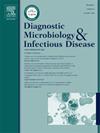Analysis of humoral and cellular responses after vaccination against SARS-CoV-2 in patients with immune-mediated diseases
IF 2.1
4区 医学
Q3 INFECTIOUS DISEASES
Diagnostic microbiology and infectious disease
Pub Date : 2025-04-04
DOI:10.1016/j.diagmicrobio.2025.116825
引用次数: 0
Abstract
Background
Patients with autoimmune disease (AID) or immunodepression (ID), particularly those treated with anti-CD20, have an increased risk of COVID-19 infection.
Objective
To characterise the humoral and cellular immune responses against specific antigens of SARS-CoV-2 in immunocompromised patients, as well as their correlation and determinants.
Methods
This retrospective study was conducted in outpatients with AID and/or ID for which an assessment of their humoral and cellular response was carried out and analysed in relation to demographic data, comorbidities, treatments, type of vaccine and number of doses.
Results
Fifty patients were included. The overall serological response rate was 76%. The cellular response was positive in 54% of patients. The main factors influencing the humoral and cellular responses were age, comorbidities and treatment with anti-CD20.
Conclusion
In ID patients, vaccination against COVID-19 can generate an adequate T-cell response, the character of which is an emerging issue in the context of COVID-19 infection. The main limitations of this study and those in the literature are the heterogeneity of the patients included and the absence of a control population. These results highlight the importance of evaluating the antiviral T-cell response and the impact of immunosuppressive treatments.
免疫介导性疾病患者接种SARS-CoV-2疫苗后体液和细胞反应分析
自身免疫性疾病(AID)或免疫抑制(ID)患者,特别是接受抗cd20治疗的患者,感染COVID-19的风险增加。目的探讨免疫功能低下患者对SARS-CoV-2特异性抗原的体液免疫和细胞免疫反应及其相关性和决定因素。方法本回顾性研究在aids和/或ID门诊患者中进行,对其体液和细胞反应进行评估,并分析其与人口统计学数据、合并症、治疗、疫苗类型和剂量的关系。结果纳入50例患者。总血清学反应率为76%。54%的患者细胞反应呈阳性。影响体液和细胞反应的主要因素是年龄、合并症和抗cd20治疗。结论在ID患者中,接种COVID-19疫苗可以产生足够的t细胞反应,这是COVID-19感染背景下的一个新问题。本研究和文献中的主要局限性是纳入患者的异质性和缺乏对照人群。这些结果强调了评估抗病毒t细胞反应和免疫抑制治疗影响的重要性。
本文章由计算机程序翻译,如有差异,请以英文原文为准。
求助全文
约1分钟内获得全文
求助全文
来源期刊
CiteScore
5.30
自引率
3.40%
发文量
149
审稿时长
56 days
期刊介绍:
Diagnostic Microbiology and Infectious Disease keeps you informed of the latest developments in clinical microbiology and the diagnosis and treatment of infectious diseases. Packed with rigorously peer-reviewed articles and studies in bacteriology, immunology, immunoserology, infectious diseases, mycology, parasitology, and virology, the journal examines new procedures, unusual cases, controversial issues, and important new literature. Diagnostic Microbiology and Infectious Disease distinguished independent editorial board, consisting of experts from many medical specialties, ensures you extensive and authoritative coverage.

 求助内容:
求助内容: 应助结果提醒方式:
应助结果提醒方式:


